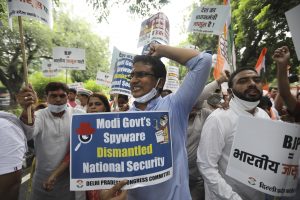The controversy over the installation of Pegasus spyware in the mobile phones of Indian opposition politicians, journalists, and activists has managed to achieve what demonetization, farmers’ protests, and mismanagement of the COVID-19 pandemic has failed to do: forge unity among the largely splintered opposition to Prime Minister Narendra Modi’s government.
The Pegasus project exposé by 17 media organizations across the world, including The Washington Post, The Guardian and The Wire, was based on a leaked database of 50,000 phone numbers that had purportedly been spied upon. The majority of the numbers were from countries with authoritarian regimes, like Rwanda, UAE, Saudi Arabia and Morocco, with India being one of the odd democratic countries to figure in the list. Over 300 numbers to date have been identified as belonging to Indian citizens who were spied upon using the Pegasus spyware.
While the Israeli spyware leak has had major international ramifications, with France ordering a high level probe – French President Emmanuel Macron’s personal telephone number figured in the list – the Modi government has chosen to treat it as a “non-issue,” despite the growing demands for the government to come clean on its role in all of this.
The Bharatiya Janata Party-led government has used its majority to stonewall any questions to date. However, the Pegasus snoop-ware issue has brought 14 Opposition parties together, vowing to “save democracy” and oust the “authoritarian” Modi regime. They even marched in protest against the government, in heavy rain from Parliament to Vijay Chowk in the capital.
In fact, the controversy has put wind in the sails of a key Modi opponent, Mamata Banerjee. The West Bengal Chief Minister and Trinamool Congress chief recently dealt the BJP a humiliating defeat in the state assembly elections. Her convincing poll victory has already given the three-time chief minister the clout to take on the ostensibly invincible Modi.
The Pegasus leak has provided Banerjee the perfect ammunition to use against Modi, especially since her nephew and political confidant Abhishek Banerjee’s phone was listed as being hacked. Her political strategist Prashant Kishor’s phone number also figured in the list; significantly, the timing of the hack coincided with the closely fought West Bengal elections.
Banerjee has lost no time in ordering a probe headed by former Supreme Court judge Madan Lokur. Astutely, she used this as an opportunity to visit the capital New Delhi and shore up support from other opposition parties and leaders during the ongoing monsoon session of Parliament.
In fact, from the first day of the session itself, India’s principal opposition party, the Congress, along with other regional parties, has been demanding that the Pegasus snooping issue be taken up for discussion. The government’s obduracy and denial of the entire episode has led to the opposition stalling Parliament for the past two weeks.
Banerjee’s much publicized meeting with Congress President Sonia Gandhi and her son Rahul Gandhi in Delhi has given rise to the prospect of a united front of opposition parties opposing Modi in the run-up to the 2024 general elections. Emerging from the meeting Banerjee said, “If the BJP has to be defeated all the opposition parties have to come together.”
The Israeli manufacturer of the Pegasus spyware, NSO, has categorically stated that it “only” sells the spyware to governments. The name of the Congress party’s Rahul Gandhi figures in the list of Indians whose phones were hacked, indicating that the Modi government was spying on its opponents. This has infuriated the opposition and puts the Modi government in a tricky situation.
It is not surprising that India’s ranking in the World Press Freedom index has been sliding consistently under Modi’s rule; the country has been ranked at 142 out of 180 countries.
Along with political rivals, the other victims of this spyware attack in India have been journalists critical of the regime, civil society activists, even a Supreme Court employee who had accused the then Chief Justice of India of sexual harassment. This further bolsters the opposition claim that the Modi regime intends to crush all forms of dissent.
Speaking to reporters at a press meet, Congress leader Rahul Gandhi said, “Our voices are being suppressed in Parliament. We just want to ask one question: Did the Indian government buy Pegasus? Yes, or no? Did they use it (Pegasus) against its own people?” He added that “the issue of Pegasus is an issue of nationalism and treason for us because this weapon was used against the democracy,” adding that for him, this was “not an issue of privacy, but an anti-national activity.”
Significantly, opposition parties have been working jointly to chalk out a strategy in Parliament to corner the government on the Pegasus issue. With little room to maneuver, the government is rumored to be working towards cutting short the four-week session.
Already, media reports citing “sources” within the government have been highlighting the massive losses incurred due to “opposition disruption tactics,” which the Congress has rebutted by asking the government to openly discuss the issue on the floor of the Parliament.
Dismissing opposition allegations, Minister for Minority Affairs Mukhtar Abbas Naqvi has referred to the Pegasus snooping allegation as “fake and fabricated.”
In marked contrast to the euphoria of the Modi wave in 2014 or 2019, the prime minister now appears to be on the back foot with the mismanagement of the COVID-19 pandemic. The poll debacle in West Bengal was a further loss of face for Modi.
In the meanwhile, the Supreme Court is scheduled to hear a slew of petitions filed by two senior journalists, a politician and an advocate, urging the court to order a probe into this grave matter of surveillance with “military grade spyware.”
It is still too early to predict whether the Pegasus controversy will enable the opposition to join hands and work consistently towards denying Modi a third term, or whether its impact will be restricted to only the stalling of a single session of Parliament.

































